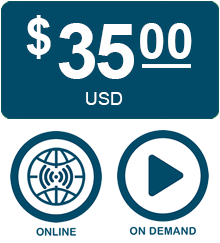
SATISFACTION GUARANTEED
If, for any reason, you are not satisfied with the course, you can receive a refund. |
Refer to the refund policy on our FAQ page.

"Studies have shown that those who listen have more
successful relationships."
— Psychology Today
"Listening is an
overlooked leadership tool."
— Harvard Business Review
"Listening tunes our brain to the patterns of our environment faster than any other sense."
— The New York Times
"In our overcrowded, high-volume world, it is easy to forget that communication isn’t a one-way street. It’s not just about broadcasting our own opinions: It’s about exchanging ideas and learning from one another."
— Forbes
"Active Listening is the single most important skill you can have in your parenting 'toolbelt'."
— The Center for Parenting Education
The course is content rich
and includes:
| |
• A video introduction
• Five course video modules
• Complete course guidelines
• 13 course handouts |
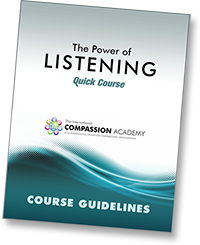
You can view and download the Course Guidelines here.
|
| For your personal, |
 |
| social, |
 |
| and professional relationships. |
 |
Technical Requirements
This is an on demand, web-based learning course. Access to a computer and high-speed internet connection is required. |

|
|
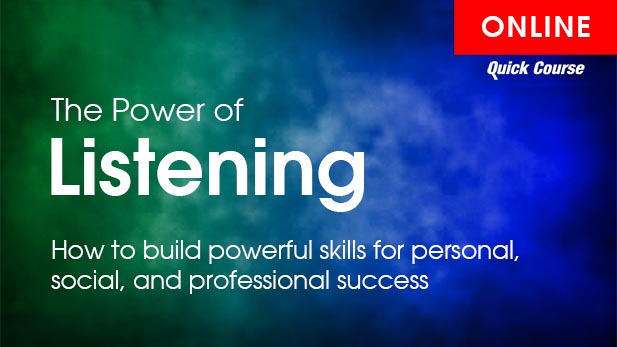 |
This course can help you to enhance your life with the essential skill acclaimed by Forbes, Harvard Business Review, Psychology Today, and others. This is especially important it you want to:
- Establish caring and rewarding personal relationships.
- Make existing relationships more caring, vibrant, and alive.
- Powerfully boost your career growth, rewards, and satisfaction.
- Strengthen your emotional intelligence (this can benefit all aspects of your life).
- Make your life more satisfying, joyous, and meaningful.
|
|
Learning Objectives and Outcomes
Objectives
The objectives of this course include:
- Understanding the difference between hearing and listening.
- Recognizing the difference between listening to respond and listening to understand.
- Knowing how and when to ask questions.
- Recognizing why people have difficulty in listening effectively.
- Understanding why people think they are better listeners than they actually are.
- Learning how to apply listening skills to help achieve one’s objectives.
- Identifying important conversational bad habits that can interfere with effective communication.
- Understanding the four stages to listening more effectively.
- Developing key skills to manage the flow of communication.
- Learning how to give the gift of good listening and receiving that gift in return.
|
|
Outcomes
The targeted outcomes for this course include:
- Improved communication.
- Strengthened emotional intelligence.
- Faster and deeper levels of acceptance by and respect from others.
- Better understanding of others — their concerns, needs, and goals.
- Enhanced relationships with family, friends, colleagues, customers/clients, and others in personal, social, and professional settings.
- Greater ease in making connections, dealing with conflict, and establishing credibility.
- Strengthened ability to create agreement with others.
- Improved support and cooperation from others.
- Reduction of personal and interpersonal stress.
- Enriched quality of life.
|
The “Power of Listening” course gives you skills to support stronger connections, greater understanding, smoother interactions, reduced conflict, and greater overall satisfaction for you and those with whom you come in contact.
Who Should Attend This Course
The course is designed for those 16 years of age or older. Those who will benefit by learning and applying the skills from this course include (but are note limited to):
- Leaders in all fields
- Business owners
- Managers
- People building their careers
- Parents
- Those looking to build deep and lasting personal relationships
- Teachers
|
- Students
- Healthcare professionals
- Counselors
- Those in political life
- Police and peacekeepers
- Those on diplomatic missions
- Tourists
|
- Conflict resolution and mediation professionals
- Attorneys
- Writers
- Researchers
- Performing artists
- Travel industry professionals
- ... and many more
|

Content
This course consists of three key elements:
- The videos, consisting of an introduction and five course modules.
- Fourteen handouts (including the Course Guidelines).
- Continued review and practice on each participant's part.
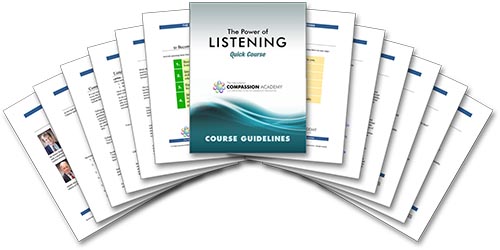
The course consists of a brief video introduction, followed by five video modules. The total video portion of the course runs just under one hour.
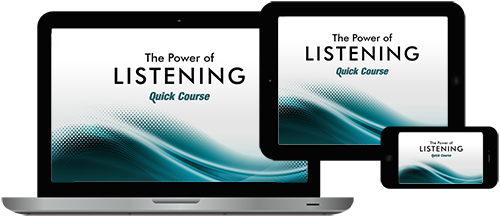
The course video introduction and modules can be viewed on any device that can go online and view videos, including computers, tablets, and smart phones. The videos may be paused, and you can go back to any point you wish to view at any time, using your device’s video controls.
Instructors
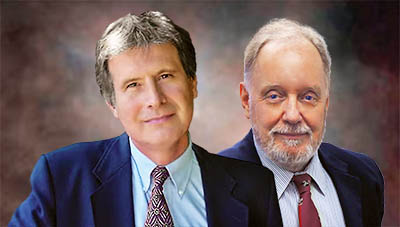
Tony Belak and Ari Cowan
| Tony Belak, JD is the Associate Director General of the International Center for Compassionate Organizations. He formerly served as the Ombuds at the University of Louisville and the former Executive Director of the International Center for Collaborative Solutions at Sullivan University in Louisville, Kentucky, where he was also on the faculty of the Master of Science in Conflict Management program. Mr. Belak was the Senior Dispute Resolution Counsel for the Department of Veterans Affairs and is not only a mediator and arbitrator but also a teacher in basic, advanced, and specialized conflict resolution. More about Tony. |
|
Ari Cowan is the Director General of the International Center for Compassionate Organizations. For his work to end violence, he received the National Public Health Award from the United States affiliate of the international physician organization that received the 1985 Nobel Peace Prize. He also received the Professionals in Human Resources Association's Award for Excellence in Human Resources. He was cited — along with Nobel Prize recipient and former President Jimmy Carter (among others) — for his assistance in bringing the first public edition of The International Bill of Human Rights to publication. More about Ari. |
|
|










